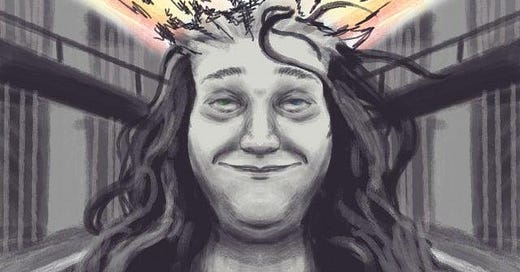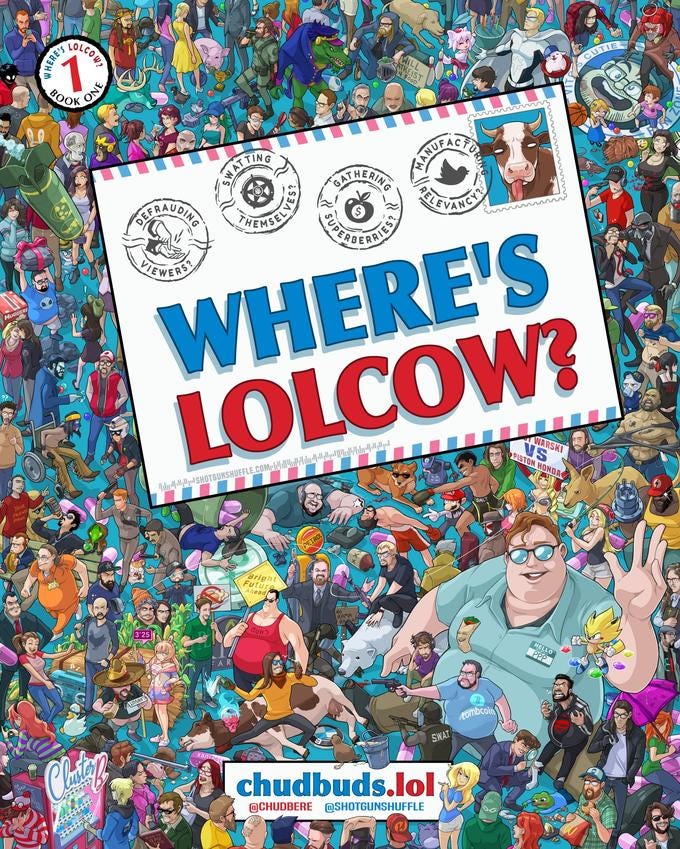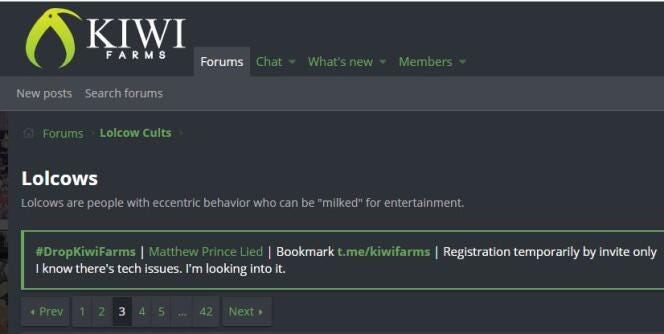An Online Menagerie: The Morbid Fascination with Lolcows
Such is the perverse yet irresistible allure of such people, and its ramifications in the real world. Ignorance is not bliss.
On August 1, 2021, Christine Weston Chandler, more commonly known as “Chris-chan”, was arrested in Richmond, Virginia. This piece of otherwise local news was witnessed online before a global audience. Although known within internet circles for two decades, and was later released on March 27, 2023 with all charges of alleged sexual assault and familial abuse seemingly dropped, the subsequent coverage on both social media and mainstream television exposed millions around the world to the phenomenon of “lolcows”: an online menagerie of the bizarre, exploitable and in certain cases, reprehensible.
A portmanteau of “lol” and “cash cow,” lolcows are commonly understood as any person who’s being trolled or attacked online, often to the point where they grow more agitated, producing a considerable amount of mockery and attention in the process. While the earliest mention on the internet is found in an Urban Dictionary submission from April 15, 2007, the general concept far predates it, be it “village idiots,” sideshow attractions or social outcasts. Nonetheless, the advent of widespread internet access has contributed to their seeming proliferation in the public consciousness far beyond what was possible just a few decades ago. As deplorable as the concept may be in polite society, there is a morbid fascination that defies simple categorization. Having been aware of such figures in online culture for over 20 years, I’d also be lying if I were to deny the perverse yet irresistible allure of such people, and its ramifications in the real world.
Chris-chan is arguably the most famous and longest-known lolcow who’s near-universally recognized as such. She has had a presence online since around 1999, complete with a wiki site compiling documentation and miscellaneous material (much of which being details posted by herself) that is more voluminous than many historical figures. With her actively resurfacing on Youtube and social media on October 17, 2023, that material is also certainly bound to expand much further. Yet she’s only one of many, scattered across platforms in myriad degrees of infamy. So many have been identified over the years that to catalog even just the notable ones in substantial detail would require whole books or incredibly lengthy documentaries for many of them. At the same time, however, to be considered one is subjective, as not everyone agrees on what makes them so. While this makes it easier to abuse the word into irrelevance or dismiss it outright, it would be foolish to do either.
Deciphering Lolcows
In spite of such ambiguity – as well as a lack of significant studies from more professional sources – online commentators and observers, such as Youtuber Rogue Internet Man, have noted three general characteristics that many lolcows share: narcissism, a lack of self-awareness, and an inability to learn from mistakes.
Narcissism is perhaps the most frequent trait, even if the reasons for such differ. Being among the first to be documented in detail, Chris-chan offers multiple examples of this in action. There’s an unwarranted sense of self-importance, from perceived fame over her fancomic Sonichu early on to her eventual delusions of being a goddess and predicting a “Dimensional Merge” melding fiction with reality. This also extends to a near-total disregard for anyone other than herself, whether it be neglecting a former female friend’s lack of romantic interest to the point of harassment, causing public disturbances in stores, or her seeming nonchalance over her own actions in online streams after 2023. While this has been partially attributed to her autism, it’s also likely that poor parenting (especially by her mother) and entitled treatment during her upbringing contributed to that inflated ego.
This goes hand in hand with a lack of self-awareness among such individuals. Chris-chan’s experiences, once more, are insightful. In 2009, she bought into an email allegedly from Nintendo director Shigeru Miyamoto offering her a job at the company to help make a Sonichu game. Setting aside how it is immediately obvious from the onset that it was another trolling attempt, her already delusional self-image meant that she didn’t catch on until several weeks later, to say nothing of her deteriorating grasp of reality later on. This also goes past gullibility, with her impulsive and frivolous spending habits involving video games, toys, and other paraphernalia to the point of hoarding. Despite having historically lived off from donations and the State of Virginia’s social welfare services (the “monthly tugboat” as she called it), as well as claims about helping the economy, she comes across as simultaneously oblivious to her financial ineptitude and all too eager to exploit the charity of others.
Another example could be found in the case of Steven “Boogie2988” Williams from Fayetteville, Arkansas. First popping up on YouTube in 2006, he gained a significant following for his character sketches, video game commentary, and seemingly affable façade as the self-proclaimed “Mr. Rogers of the internet,” having over 4.6 million subscribers on the platform by 2019. When his increasingly abrasive behavior on social media (from inappropriate comments to slandering other content creators) came to light not long after, he instead chose to double-down, acting as if he was being targeted over his mental and physical health. This both earned further disdain from critics and trolls alike. That he tried pleading his audience for money in 2022 after putting his life savings on an ill-advised cryptocurrency bid, and outright scammed them in 2024 by promoting a questionable crypto project, reflect a recurring trend of lowcows being unable, or unwilling, to learn from their mistakes.
There is, however, a fourth characteristic shared by a select subset of lolcows. This is exemplified by social media personality-turned-vagrant Daniel Larson. A young man from Denver, Colorado, he’s been described as a next-generation Chris-chan due to a similar fixation with the internet, having enough documented material for his own wiki, and multiple diagnoses of mental illness. He’s gained infamy for making cryptic posts about running for President, as well as delusional claims of being a professional artist on the verge of making it big (gaining over a million views within a few months of his first TikTok account in March 2020). This notoriety, however, also includes documented stalking of underaged girls online (at various points claiming to be the boyfriend of music celebrity Grace VanderWaal when she was still a minor), divulging his personal “collection” of questionable material to underaged TikTok viewers, and being manipulated by troll “managers” to do inappropriate acts.
What sets him, alongside Chris-chan herself, apart is a tendency to not just express abhorrent views, but also act on them, whether it be property-damaging temper tantrums, beating up his own caretaker before running away, lashing out at people in public places while homeless, or making multiple bomb threats. Given his own run-ins with law enforcement and public shows of violence, his most recent incarceration on May 10, 2024 including federal charges related to said threats, the idea that he’s unstable enough to attempt such reckless actions does not seem so farfetched. It is thus not without reason that they’re called “horrorcows” in internet slang. With behavior crossing the point of no return, they’re so far gone that they make even the most jaded trolls pause, if not unnerved.
Pinning the Blame
For as long as there have been lolcows, people have sought to blame toxic internet culture for their very existence. Almost from the moment Chris-chan was released from custody in 2023, there were those on social media who were inclined to view her as a victim of either harassers or wider society, especially in light of her claims of being transgender. Some like Youtuber Will “Channel Pup” Grantham, went so far as to blame trolls and observers at large for creating her.
By virtue of Chris-chan’s coming of age at a time when the internet was much more of a “Wild West” in terms of what was (or wasn’t) acceptable, it seems understandable why some may likewise think the same at first glance. The exploits of people such as “BlueSpike” and the “Idea Guys” in particular have since become infamous among online circles, even among other trolls, for their sheer maliciousness – whether by forcing her to do questionable deeds to her own body or by feeding into those delusions to the point of enabling the Dimensional Merge that would fuse her beloved Sonichu with the real world. There’s no doubt that the kind of exploitative, toxic discourse behind those who contributed to Chris-chan’s deteriorating sanity. While her interactions with another malicious person named Isabella Janke is believed to have contributed to the sexual assault allegations that spurred her 2021 arrest in the first place.
That general ire isn’t aimed just at anonymous users on imageboards like 4chan. Platforms like Kiwi Farms (originally a forum to discuss Chris-chan but has since evolved into a community dedicated to lolcows in general) have also come under scrutiny for allegedly hosting active harassment campaigns against certain individuals, in at least one case purportedly leading one target of bullying to commit suicide. Mother Jones’ Ali Breland on February 2023 not only framed the site as a haven for such bullying, but also being ground zero for reactionary thought and anti-trans bigotry. Shutting it down, therefore, would be a step forward in making the internet a safe space for all. Efforts to crack down on the site and its userbase, though, remain unsuccessful despite premature gloating, whether due to insufficient evidence or the tenacity of the site’s owners. This has not dissuaded those pinning the blame on amorphous bigots from seeing their ideas as common sense.
As tempting as it is to combat trolling and harassment through sweeping measures, it is deceptive solution. As the Electronic Frontier Foundation warned in October 2022, such blanket “deplatforming” wouldn’t just undermine the content-neutrality that makes the internet and its underlying infrastructure function but would severely compromise privacy and freedom of expression. What’s often classified as “hate speech” alone can depend on the whims of activists, corporate executives, and government policymakers with conflicting interests. As Katharine Cross begrudgingly conceded in an otherwise pro-censorship September 2023 WIRED piece, those very efforts could all too easily wind up targeting the very people they’re meant to protect, drive those being deplatformed underground and away from the limelight, or give others an excuse to exploit the resulting witchhunts to suit their own agendas.
As much as it could be argued that trolling has played a role in influencing, if not goading, them into misadventures, there are myriad other factors involved. For instance, Boogie2988’s manipulative fundraising and cryptocurrency fiascoes were self-inflicted, with neither outside involvement nor any claims of having autism to hide behind. Chris-chan, in addition to having an established record of being just as capable of making public spectacles out of her own volition, was also known to have experienced a dysfunctional upbringing, such as her parents being unwilling to send her to a special school (for fear of being institutionalized) and a lack of meaningful intervention until it was too late. One may also be much more likely to feel sorry for who they once were, such as with a young Daniel Larson before his spiral to infamy, than the people they’ve become by virtue of their own misdeeds.
Perhaps the notion that they could be both victims and their own worst abusers, that some systemic negligence within their immediate communities may have been at play, or some combination of other reasons is too uncomfortable, if not inconvenient to consider. Maybe it is just easier, and more cathartic, to make scapegoats out of them. With or without sites like Kiwi Farms, the ever-growing awareness of lolcows in the zeitgeist would only risk emboldening more trolls and enablers, as well as those seeking cures worse than the disease. In the eyes or more malicious individuals, their existence also reinforces the notion that their negative stereotypes – whether it be against gamers, fans of niche hobbies, “neuroatypicals”, or minorities in general – are vindicated, if not prove that the “degeneracy” they represent are a social harm. With how increasingly polarized online discourse has grown, fears that that this could breed further resentment against those not deemed normal, if not foster a vicious cycle of hatred and abuse are not unfounded. Given how autism alone remains stigmatized as a “shameful affliction” in parts of the world, decades of progress in social acceptance being undone is not beyond the realm of possibility.
A Cycle Impossible to Ignore
For the average onlooker, who has little to no direct interaction with lolcows at all, it might seem as though the “safest” solution lies in not giving them attention. As an old online truism goes, do not feed the trolls. This is much easier said than done. Perhaps part of the reason why could be attributed to a less-discussed pattern that encapsulates most if not all of those attributes. Namely, how those failings, more often of their own making, also trap them in a cycle that keeps in the limelight. While there are myriad variations, none quite exemplify this as what’s revealed in independent filmmaker Mike Clum’s documentary “The Dark, Sad Life of Boogie2988” on October 31, 2023 (garnering over 5.2 million views as of July 12, 2024), and what happened afterwards.
Beyond highlighting his monetary ineptitude, health problems borne from his lifestyle and a paradoxical mix of ego and self-loathing, it also showed a seemingly empathetic side. The subject showed apparent self-awareness of his plight, convincing himself (and others) of wanting to change. By the end, he appeared to commit to this with the help of a backwoods shaman, vowing as Steven Williams to step away from his old life and the trolls. It wasn’t long before others like Mutahar “Some Ordinary Gamers” Anas began questioning certain details (such as inconsistencies with his actual finances) and whether he was manipulating people with such claims. As explained by Youtuber Cuestar a few weeks later, Boogie2988 not only downplayed the errors as irrelevant when confronted, but passive-aggressively blamed the filmmaker, despite being the one who gave that information as true. Not that it stopped the lolcow from milking the documentary for showing the “real” him, at least until his next misadventures.

This cycle of drama, doubling-down, exploiting empathy and then moving on isn’t simply an inability to learn or a case of gullibility. Rather, it betrays how, whatever they may say about wanting to change or be left alone, lolcows tend to perversely crave the attention despite the self-destruction, and that if ignored, will find some way to get noticed, as Chris-chan has been doing since returning to social media. Which isn’t to ignore the all too human fascination of watching a trainwreck. There’s something morbidly fascinating about it all: at different times harrowing, baffling, revolting, grimly hilarious, and yet all the same, nigh-impossible to look away. Neither could I, for much of the same reasons. Even after doing deeper research on the people behind the lunacy, it couldn’t be helped. If only just to keep watching and see where they’re heading.
A Mirror into Ourselves
This online menagerie is not some fad that would fade way or disappear into the ether like the village idiots of yesteryear. Nor can it be confined to any one culture given the existence of the likes of Rainer “Drachenlord” Winker in Germany and a man known in Philippine internet folklore as “BongBong Gising”. At the same time, the appeal needn’t just have to be out of entertainment or watching chaos unfold in near-real time. The experiences of lolcows offer a chronicle that would otherwise be ignored if not for the internet – from the rise and fall of an “e-celebrity” as encapsulated by Boogie2988’s career, to the snapshots of 21st Century America through the eyes of Chris-chan and her trolls. Even the most depraved and delusional of horrorcows can provide an insight, or at least valuable leads, into their state of mind which, once upon a time, would have been kept out of sight – which may be the one silver lining in Daniel Larson’s ignoble escapades. Ignorance is not bliss.
Rather than taking the fool’s errand of resealing Pandora’s Box, pretending to look the other way, or repeating the past with some misguided crusade against degenerates, perhaps it’s better to account for living with the reality as it is. Beyond fostering voluntary checks-and-balances in online discourse to keep trolls in check, this can mean educating parents and institutions to help those most susceptible, which may include keeping social media access away until they’re ready. This can translate into reaching out to such individuals before they cross the point of no return. These would not necessarily stop future ones from being created, and as seen with the ongoing collapse of Larson’s life, some may already be beyond help. Nonetheless, the knowledge gained, along with a little more well-placed empathy, may yet go a long way to mitigate the worst excesses, if not reshape the overall atmosphere without sacrificing what makes the internet so valuable.
For better or worse, lolcows also provide a dark mirror to the audience. That even an otherwise mentally-sound personality like Boogie2988 (despite prior attempts at claiming to have mental disorders) could find himself trapped in pitfalls of his own making despite having every chance to genuinely walk away remains a perverse if sobering reminder for those tempted to push their luck. By that same token, there’s also something to be said about their failures being a tutor. Among the various observations made by Youtuber Madison “greymads” Gray in January 2023 is the fact that nobody is born (or destined) to take up that misbegotten mantle. As much as one could judge or mock someone like Chris-chan, anyone could just as easily wind up in similar predicaments for all kinds of reasons – be it the fallout of a personal crisis, harassment from a persistent bully, obsession with fame, or one bad decision too many – as much as many, myself included, may like to believe otherwise.
Perhaps this need not be said at all. As much as I’d wish otherwise, this is not an ideal world. Yet even as millions watch the morbid spectacle, it’s worth stressing how it’s always been in any person’s power to choose rather it being some inevitable fate or an excuse to grandstand. That there are lolcows who have sunk so low despite all the chances in the world, however, may say more about them, and human beings in general, than one would ever wish to admit.














